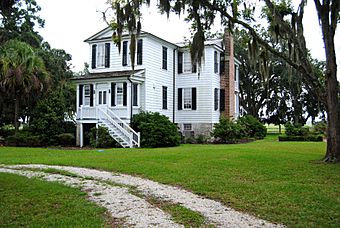Tombee Plantation facts for kids
Tombee Plantation is a very old and important house located on Saint Helena Island in South Carolina. It was built a long time ago, around the late 1700s or early 1800s. This house is special because it tells a unique story about American history, especially about the lives of people who were once enslaved and later became free.
Quick facts for kids |
|
|
Tombee Plantation
|
|
 |
|
| Location | South of Frogmore on St. Helena's Island, near Frogmore, South Carolina |
|---|---|
| Area | 14 acres (5.7 ha) |
| Built | c. 1790-1800, 1862 |
| NRHP reference No. | 75001688 |
| Added to NRHP | September 18, 1975 |
Contents
Exploring Tombee Plantation
Tombee Plantation is a historic house on Saint Helena Island. It is found near the town of Frogmore. The house was built between 1790 and 1800. It is a two-story building made of wood. The outside is covered with wooden boards called clapboard. It has a roof with two sloping sides, known as a gable roof.
The front of the house has a single-story porch. This porch has four square pillars supporting its roof. At the back, there is a two-story porch. This back porch has a railing and six square pillars on each floor. Tombee Plantation is one of the few old plantation houses left on Saint Helena Island. Many of these houses were built before the American Civil War.
Its Unique History
Tombee Plantation has a very interesting past. During the American Civil War, in 1862, the land of Tombee Plantation was divided. This happened as part of a special program called the "Port Royal Experiment."
The Port Royal Experiment
The "Port Royal Experiment" was a program that started during the Civil War. It aimed to help formerly enslaved people. When Union soldiers took control of the Sea Islands, many plantation owners left. The land was then used to help freed slaves. They were given the chance to work the land for themselves. This was a big step towards freedom and self-sufficiency for many families.
A Special Place in History
After the Civil War, the land of Tombee Plantation stayed with the families of freed slaves. They owned and lived on the land for many years. This continued until 1971. This makes Tombee Plantation very special. It shows how land ownership changed after slavery ended.
In 1975, Tombee Plantation was added to the National Register of Historic Places. This means it is recognized as an important historical site. It helps us remember and learn about a significant time in American history.
 | Bessie Coleman |
 | Spann Watson |
 | Jill E. Brown |
 | Sherman W. White |



